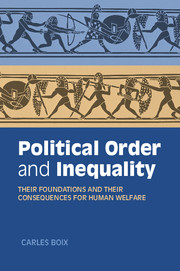2 - Political Order
Published online by Cambridge University Press: 05 March 2015
Summary
Chapter 1 showed that human cooperation is feasible without having to establish an institutionalized authority to enforce peace – provided that individuals are roughly equal in both economic resources and ability to fight. Such a state of cooperation may take place through two alternative forms: in the form of individuals (or, at most, households) living separately and avoiding any systematic conflict among themselves; or in the form of a community of people living together – either to share risks or to exploit some complementarities in the process of production. Either way, however, life under a situation of spontaneous cooperation is poor, nasty, brutish, and short. Men and women live at the margin of subsistence, almost always exclusively preoccupied with satisfying their most elemental material needs, and with their private behavior and conversations strictly fettered by a community that punishes any deviation from the socially expected standard of behavior with ostracism and sometimes even with death.
This chapter turns to explore the construction of the state, its nature and consequences. The section “Learning-by-Doing, Inequality, and Sorting” describes the process of technological change that results in the breakdown of the spontaneous or self-enforced cooperation equilibrium. The following section, “From Conflict to Political Order,” examines the alternative political regimes (in a range that goes from monarchies to imperial republics) through which order can be reestablished. This includes an analysis of the concept and foundations of political obligation. The section “Monarchies or Republics? The Role of Warfare” outlines the conditions (war technologies and extraction mechanisms) that determine which type of political regime will prevail. With those results in mind, ”Warfare and the Number and Territorial Size of Political Regimes” discusses why republican governments were smaller, shorter in duration, and much more infrequent than monarchies around the world at least until the nineteenth century. The following two sections describe the consequences that each political solution has on both the distribution of income and growth.
- Type
- Chapter
- Information
- Political Order and InequalityTheir Foundations and their Consequences for Human Welfare, pp. 60 - 91Publisher: Cambridge University PressPrint publication year: 2015
- 1
- Cited by



